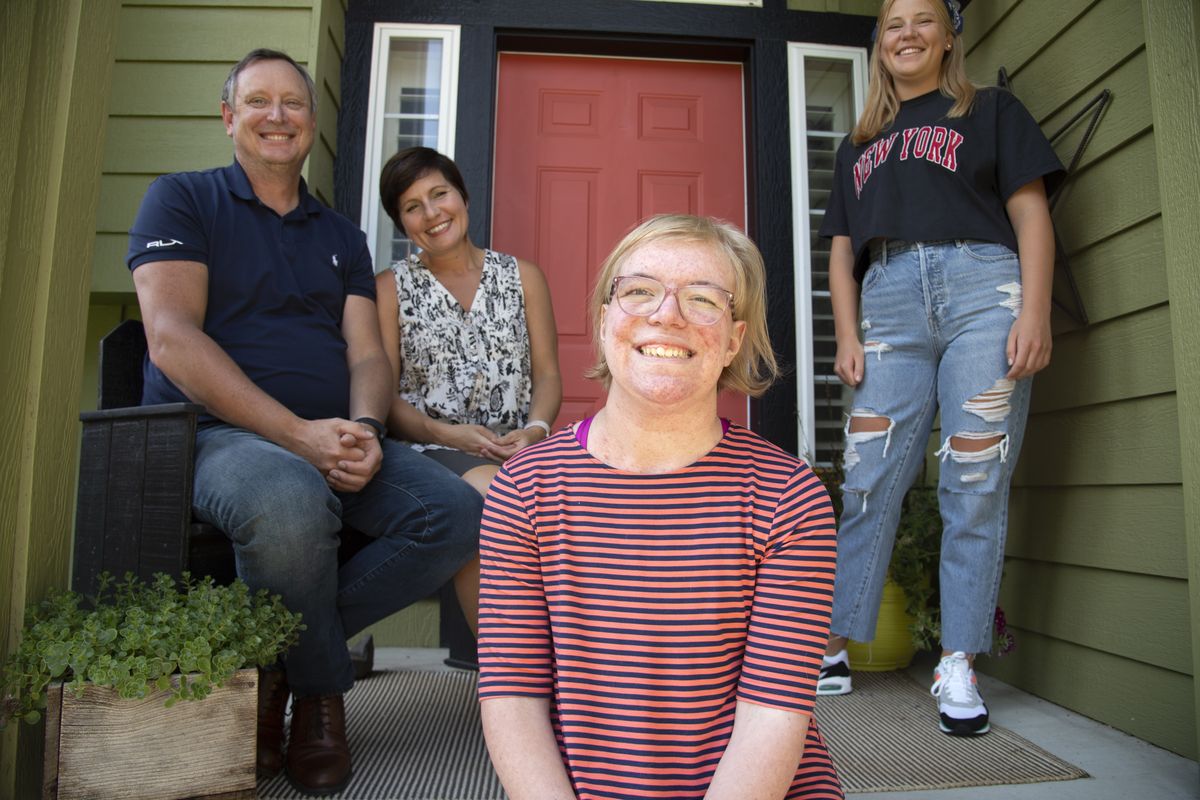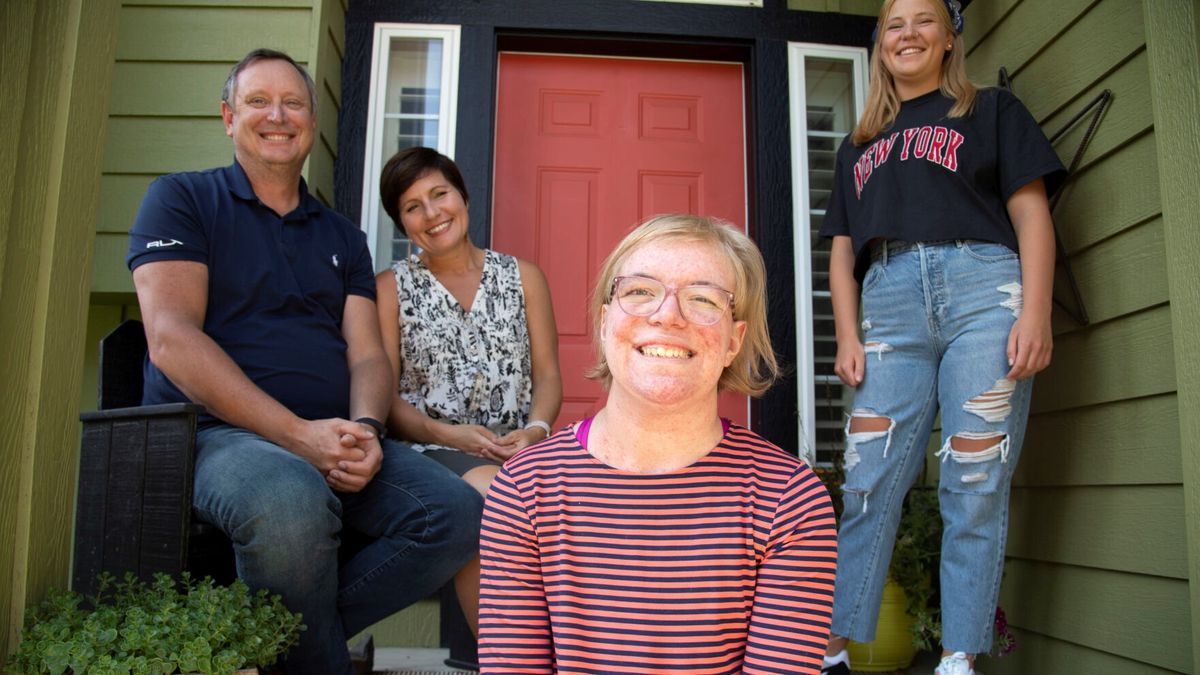Timely call: New medication shrinks Spokane high schooler’s tumors
The Carney family – from left Grace, Chris, Janet and Gillian – at Christmas, about 2½ months after Grace started taking an MEK inhibitor. (Courtesy)
Last October, Grace Carney was set to have surgery on her spine. But two days before, her surgeon received a call from another doctor suggesting a different treatment – and it has worked even better than expected for the Ferris High School student.
Grace, 18, has neurofibromatosis type 1, a genetic disorder that causes tumors all over the body, including on nerves. She was scheduled for the surgery at Seattle Children’s Hospital because of one tumor wrapping around the spinal cord in her neck and compressing it. Doctors told her family that Grace, who had trouble walking and kept falling, was one fall away from becoming a quadriplegic.
Neurosurgeon Dr. Samuel Browd was set to perform the complex surgery until getting that call from neuro-oncologist Dr. Sarah Leary suggesting Grace first try taking an MEK inhibitor. Within a few weeks of taking the daily oral medication called trametinib, Grace started walking better. Over several months, her tumors have shrunk.
“It was Saturday in the middle of the afternoon, and I get a phone call from the surgeon himself who was at his son’s karate tournament saying he’d been contacted (by Dr. Leary) and thought there was a medication that could be used in lieu of the surgery,” Grace’s dad, Chris Carney, said.
He and his wife, Janet Carney, later that night had a conference call with Browd to answer questions. “The biggest question we had was what would you do if this were your child?” Carney said. “He said that he felt the risk of the surgery was greater than the risk of trying the medicine and waiting.
“But he didn’t want it open-ended; he wanted to see results fairly quickly.”
While the family could tell Grace was improving on the medicine, they returned regularly to Seattle for MRIs and follow-ups, Carney said. Then, imaging about two weeks ago announced a drastic change.
“This last MRI we got a couple weeks ago was just that amazing news that the tumor is officially no longer compressing her spine,” he said. “The spinal fluid is flowing, and there’s been a dramatic difference in the last three months.”
Nearly a year ago, Grace was referred to Seattle Children’s. Before a then-planned leg surgery, her physician at Shriners Hospital for Children had asked for an MRI, which revealed the tumor – called plexiform neurofibromas – growing on nerves and affecting the spinal cord.
Since starting on the medication in October, Grace has received treatment from Dr. Aimee Sato, a neuro-oncologist and medical director of Seattle Children’s Neurofibromatosis Program. Sato also heard about Grace from Leary, the hospital’s brain tumor program director.
MEK inhibitors are approved to treat melanoma and other types of cancer, but researchers in recent years found their effectiveness in treating some brain tumors and plexiform neurofibromas. Now, Seattle Children’s is using MEK inhibitors for more than 40 children “who are having a great response on this medication,” Sato said.
“The MEK inhibitor has been used in cancer research for over a decade, but the application of this for individuals with NF1 is relatively new,” Sato said.
“It’s a targeted biologic therapy, meaning that it works on certain proteins that are turned on in certain tumor cells … this MEK inhibitor inhibits those proteins that are turned on in tumor cells so that the tumor cells stop growing and also start shrinking.”
NF1 tumors are usually benign but can impact quality of life. Typically starting in childhood, the disorder affects about 1 in 3,000 people.
Even Sato was surprised at how quickly Grace improved with the medication, she said. The falls stopped. Doctors think Grace will be on an MEK inhibitor for at least two years.
“Within the first month, Grace said she felt stronger and was able to walk without a walker, which was huge,” Sato said. “Her leg strength was much stronger. She stopped having the neck pain, and she also had improved sensation in her arms.
“I was thinking it would likely have taken much longer before we started seeing benefits. My goal was to stabilize the tumor, but to see actual shrinkage was unbelievable that quickly.”
The spinal-area tumor had been a major concern, as were Grace’s falls, neck pain and tingling in her arms.
“I was surprised, as was her neurosurgeon Dr. Browd, at the amount of compression that was pressing on her spinal cord,” Sato said. “If there was a complete compression of her cord, she would have become ventilator-dependent and quadriplegic, meaning unable to move from the neck down. So it was a very dangerous location, and she was very close to having an entirely different kind of life.”
The medicine has minor side effects such as a face rash, foot swelling and hair loss, but her family saw early signs that Grace’s walking improved.
“Right off the bat, we started seeing some physical improvements with Grace, mostly in her walking,” Chris Carney said. “She had kind of hit the point where she just would not walk much, and she was really up on her toes when she did walk.”
Within a few weeks of her taking the medicine, “We could see that she was getting more flat-footed and willing to walk more,” he added. “On her foot, she has another tumor that’s really always been there. She had another surgery years ago to debulk it, but we could just visually see it getting smaller.
“The cool thing about the medication is she has tumors all over her body, and it’s shrinking all of them.”
Janet Carney said Grace, who is cognitively delayed, has shown other gains. “With the MEK inhibitor, I feel that’s helped her cognitively, as well. She’s able to be understood and express herself much better than she could prior to the medication.”
She said her daughter is more active and enjoying the family’s Spirit Lake vacation home. The house has a quarter-mile uphill trek from the lake, and last year, they had to take Grace up on an ATV. Now, she’s venturing out regularly and going on walks.
Over the years, Grace and her family have received support from Spokane-area runners in the Summer Solstice 10K and Kids Race hosted by Fleet Feet Spokane and raising money for the Children’s Tumor Foundation.
Janet Carney said it’s especially touching because the event has helped support NF1 research, including for MEK inhibitor use that’s benefiting Grace. “So every person who has donated, participated, supported or ran in the race is part of her success story.”


